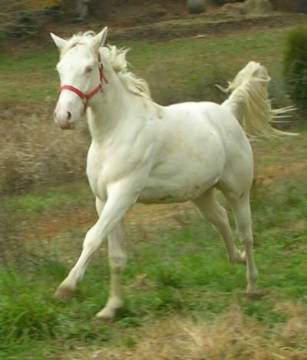 |
Quick Search |
 |
|
|
|
|
|
| Join Up |

|
With the current popularity of natural horsemanship, the term "join up" often
prompts the same mysterious wonder in horse owners as the term "horse whisperer".
Everybody wants to have a special bond with their horse. But often the magic
they've seen at a trainer's clinic just doesn't translate when they try it with
their horse at home. Why?
Join up is a round pen method that is meant to bring a horse's attention to the
trainer, establish a sense of trust, and get the horse to allow the trainer to
handle it. A horse's fear and natural flight instincts are what join up is meant
to overcome, so that the horse willingly accepts a trainer's presence, touch, and
handling. It establishes a good foundation for all other training that will follow.
The way join up works is the horse is put in a round pen or other enclosure.
The trainer begins by asking the horse to move away from him, usually using a
longe whip or flag stick to encourage the horse to circle the pen. A young horse
will most likely trot or canter, looking for a way out of the pen to escape the
trainer and his swishing whip. After a few circles, the trainer asks the horse to
switch directions and go the other way around the pen. The body language of the
horse should be watched closely, and as he begins to understand that there is no
way out of the pen, he will start to look for other ways to alleviate the stress
placed on him. He may start flicking his ears towards the trainer rather than the
outside of the pen, he may want to stop and lower his head and sniff the ground.
He may turn towards the trainer and approach. All of these are signs that he is
thinking and focusing on the trainer rather than escape.
At this time, the trainer should change his body language from an aggressive stance
to a more friendly look, lowering the whip and not swishing it, holding one hand out
towards the horse in a "come here" request, and taking a step towards the horse's head.
If the horse wheels and runs, the trainer should once again become aggressive and
drive the horse around the pen several more times, again watching for the signs of
acceptance from the horse. If the horse does not run, but accepts being petted
and touched, the trainer can begin touching the horse all over and establishing
a sense of trust in the horse. If at any time the horse turns away from the trainer
or starts focusing on something else (other horses nearby, or eating grass, etc.)
the trainer should ask the horse to step out again, and trot another circle before
stopping to be petted more. This teaches a horse that the "right" place to be is
near to the trainer. If he chooses to leave, he may, but it results in being driven
and made to trot another circle. The horse quickly learns to stay very close,
and even follow the trainer as he moves. A horse taught to accept handling this
way should be easy to catch and halter for the rest of his life.
A big misconception about join up is that it will benefit every horse. Horses are
individuals and each one has different experiences in its past that have formed its
thinking. Most young colts or horses that have had very little handling will respond
well to join up. However, horses that have been ridden for years and are very gentle
may not understand the concept at all, since they have no fear or mistrust of their
handler. Horses that have learned negatively or been abused may never join up with
a trainer, either, since their fear level has been built up and strengthened. So join
up is not for every horse, and it isn't guaranteed to work. Many people watch a
trainer work with a horse and think that getting the horse to follow you is the ultimate
goal and constitutes "bonding". This is not necessarily true, and the horse's following
simply means that the horse has accepted its situation and has learned to respond to
the trainer to avoid being driven away.
True bonding is something completely different than join up, and cannot be achieved
in an afternoon with a few simple steps. Bonding with a horse may take several years,
and may only happen with one or two horses in a person's lifetime. It is summed
up in this quote: "Wet saddle blankets are the foundation for making a true bond
between you and your horse." Bonding is something that happens from spending a lot
of time with your horse, working together to accomplish new tasks, going through a
lot of different experiences together, and remaining a team through failures and
successes.
More Horse Articles
|
|
|

